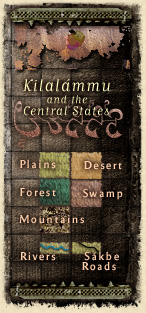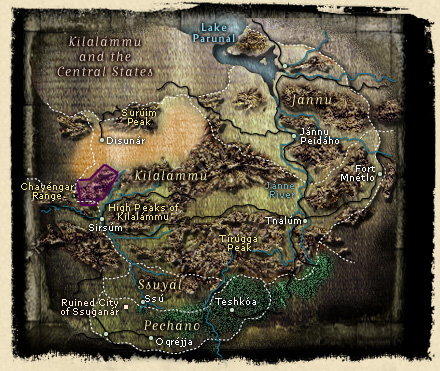 The Lands of Tékumel
The Lands of Tékumel
Kilalámmu and the Central States
The mountainous Kilalámmu and the central states of Jánnu, Chaigári, Ssuyál (with its ancient Ssú-haunted ruins of Ssuganár) and Pecháno.
The government of Pecháno is similar to Salarvyá, though their king (Pecháni: Chaegósh) is both sane and fully in control of his subjects. The Assembly of High Lords is dominated by two ruling houses, the Beneshchán lineage of Mechanéno and the Rekhmél family of Teshkóa, whose lands are divided into smaller and smaller fiefs amongst descending tiers of vassals.
Jánnu is ruled by a council of clan-elders called the Assembly of Spears, though tasks of governance are performed by local clans. The king (Jannuyáni: Sháú) is little more than a figurehead. The mountainous region of Kilalámmu has almost no formal apparatus of government: clans exercise supreme authority in their own territories.

The villagers of Jánnu and Kilalámmu make yearly pilgrimages to squat hilltop shrines (said to contain variants of the Engsvanyáli deities)—and refuse to speak to anyone they meet on the way, no matter how great the provocation. The Pecháni revere the Seven Deities of the Rising Peaks: Thúmis, Karakán-Vimúhla, Avánthe-Dlamélish, Ksárul, Sárku-Belkhánu, and two unidentified gods: Quóth the Many-Eyed, and the warrior-hero, Nyésset of the Pinacle. The faiths (if any) of the inimical Ssú are unknown.
The mountain folk of Jánnu and Kilalámmu are thought (at least by the Tsolyáni) to be rustic, naive, rather stupid, and easily excited. The Pecháni, similar to the Salarvyáni but grimly serious, powerful warriors, and dedicated to the eternal war against the Ssú.
